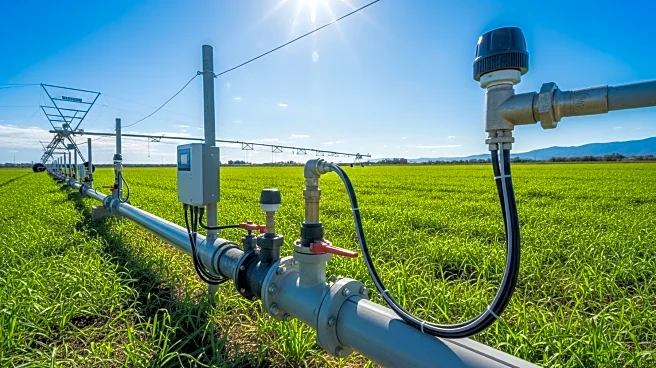What's Happening?
A recent study published in Agronomy highlights the potential of data fusion in agriculture to address global water scarcity. The research suggests that integrating technologies such as remote sensing, agro-meteorology, and wireless sensor networks can significantly reduce water usage without compromising crop yields. This approach is particularly beneficial for high-value fruit crops like mango, avocado, and vineyards, where precise irrigation is crucial. The study reviews evidence from multiple sources, demonstrating that combining these technologies improves the accuracy of water demand estimation, leading to more efficient irrigation practices.
Why It's Important?
The integration of advanced technologies in agriculture is crucial for sustainable water management, especially as climate change exacerbates water scarcity issues. By optimizing irrigation practices, farmers can reduce water consumption by up to 30%, which is vital for maintaining productivity in water-stressed regions. This approach not only supports environmental sustainability but also enhances the economic viability of agriculture by ensuring consistent yields. As water scarcity becomes a pressing global issue, the adoption of data-driven irrigation strategies could play a pivotal role in securing food production and supporting agricultural communities.
What's Next?
The future of smart irrigation lies in the continued development of artificial intelligence and machine learning technologies, which can further refine irrigation strategies. Digital twin models, which simulate real-world farms, are emerging as tools to test and improve irrigation methods before implementation. Additionally, efforts to make these technologies accessible to small and medium-sized farms are underway, with the development of low-cost Internet of Things platforms. Collaboration among researchers, policymakers, and farmers will be essential to overcome challenges related to calibration, accessibility, and governance.
Beyond the Headlines
The adoption of integrated irrigation systems highlights the transformative potential of technology in agriculture. It underscores the need for innovation in addressing environmental challenges and the importance of collaboration across sectors to achieve sustainable solutions. This development also raises ethical considerations regarding the equitable distribution of technological resources and the need to ensure that all farmers, regardless of scale, can benefit from advancements in irrigation technology.










